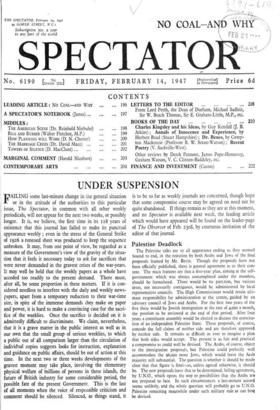Palestine Deadlock
The Palestine talks are to all appearance ending as they seemed bound to end, in the rejection by both Arabs and Jews of the final proposals framed by Mr. Bevin. Though the proposals have not been officially published, there is general agreement as to their con- tent. The man features are that a five-year plan, aiming at the self- government which was always contemplated under the mandate, should be formulated. There would be no partition, but various areas, not necessarily contiguous, would be administered by local representative councils. The High Commissioner would retain ulti- mate responsibility for administration at the centre, guided by an advisory council of Jews and Arabs. For the first two years of the five there would be Jewish immigration at the rate of 4,000 a month, the position to be reviewed at the end of that period. After four years a constituent assembly would be elected to discuss the constitu- tion of an independent Palestine State. These proposals, of course, concede the full claims of neither side and are therefore approved by neither side. It remains as difficult as ever to imagine a plan that both sides would accept. The present is as fair and practical a compromise as could well be devised. The Arabs, of course, object to the immigration proposals, but Palestine could perfectly well accommodate the 96,000 more Jews, which would leave the Arab majority still substantial. The question is whether it should be made clear that that figure is final—as, unless agreed otherwise, it should be. The new proposals leave that to be determined, failing agreement, by U.N.O., which opens the way to possibilities that the Arabs aro not prepared to face. In such circumstances a last-minute accord seems unlikely, and the whole question will probably go to U.N.O. Palestine remaining meanwhile under such military rule as can ben be devised.


































